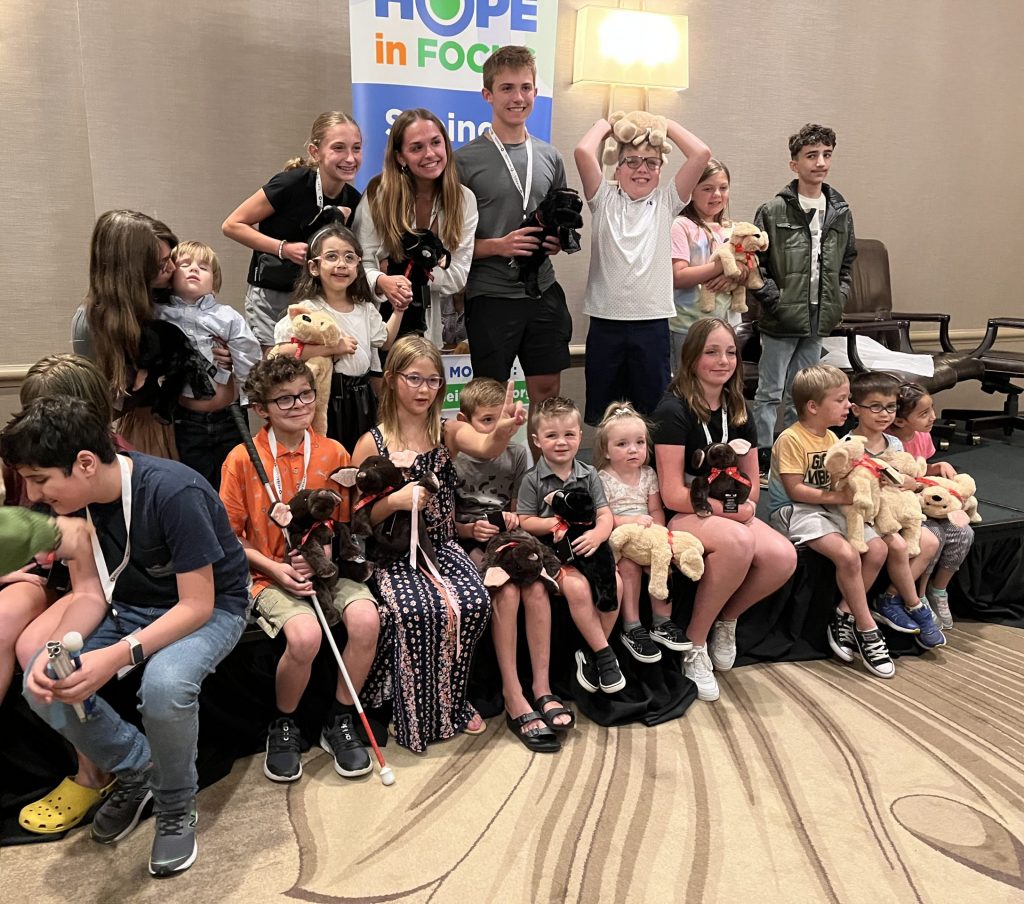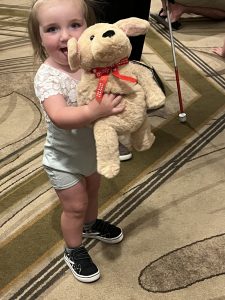Hope Rules at 2023 Hope in Focus LCA Family Conference in Indianapolis
Our 2023 LCA Family Conference* in Indianapolis offered many reasons to feel hopeful about more retinal disease treatments coming to fruition and in less time than the dozen or more years it’s taken to bring a therapy to market, despite the deep complexities and tremendous expense of researching and developing LCA therapies.
More than 100 people gathered in late June from around the globe in Indianapolis for the Hope in Focus LCA Family Conference – making friends, meeting researchers, and establishing connections to help better navigate life with Leber congenital amaurosis, a rare inherited degenerative retinal disease.
The conference succeeded in its goal of creating an ideal environment for thoughtful and interactive exchanges of knowledge, ideas, and viewpoints in sessions focusing on research, future treatments, advocacy, shared stories, and connections with people traveling similar journeys.
The Hotel Omni Severin’s mezzanine on Friday, June 23, to Saturday, June 24, buzzed with the sounds of LCA families socializing with conference speakers and families, kids with LCA running around having fun, and grownups meeting other adults living with the rare disease.
As one caregiver said of the event: “This is fantastic! I’m getting answers to questions I didn’t even know how to ask.”
People from the Midwest, the rest of the country, and around the globe – from Canada, Mexico, Turkey, and China – converged in the Racing Capital of the World to hear from LCA families, retinal doctors, researchers, advocates, and representatives of the biotechnology and pharmaceutical industries.

A mix of kids and caregivers attending the 2023 Hope in Focus LCA Family Conference in Indianapolis
Navigating the LCA Ecosystem
Laura Manfre, Board Chair and Co-Founder of Hope in Focus, welcomed the group to our third LCA Family Conference, and its first in four years because of in-person social limitations caused by the COVID-19 pandemic. The next conference is set for 2025.
Advancing treatments for LCA is part of an ecosystem many may not have thought about before being thrown into it with a rare disease diagnosis, Laura told the group.
“No one asked to be a part of this disease or came into this knowing how to navigate this journey for their child, their family, or themselves,” she said. “We are all figuring it out as we go, and the more we can connect with one another, the better we are able to learn and share and support one another.”
Hope in Focus gathered representatives from this LCA ecosystem – from pharma and biotech, to regulatory to research and healthcare, with each stakeholder playing a critical role necessary to developing treatments for LCA.
“We all need one another to make this work.”
Even having the kids at the conference get together for a day at the Children’s Museum of Indianapolis, while their parents attended panel discussions, marked a milestone of sorts for children with LCA.
“How often does that happen that sighted and visually impaired siblings get to be in a group together like that? It’s really cool.”
Laura, her husband, Charles Priebe, and their good friend Elisse Rosen founded Hope in Focus nearly 10 years ago to raise funds for research, after doctors told Laura and Chuck their 11-year-old daughter Sofia had LCA17 caused by a mutation in her IQCB1/NPHP5 gene.
Laura explained Sofia’s absence from the conference, where she had planned to talk about living with LCA.
“She is now 20, a rising junior in college, and her vision is getting worse,” Sofia’s mom said. “Yes, she was supposed to be here and be on a panel, but she finally, after years of waiting, got a guide dog and is just wrapping up two weeks of training with her new dog.” (By the end of the conference, Sofia received her new pal, a beautiful black lab named Winsome.)
Laura learned raising funds was important, but money alone doesn’t solve the issue.
“Personally, and, for Hope in Focus, the last decade has been a learning experience of all the things that need to come together to pave the way for treatments for ourselves and our children.

Lennon Schleihauf hugs her new doggie. She and other children at the Hope in Focus LCA Family Conference received the plush toys as a gift from Two Blind Brothers. Each dog’s name is embossed in Braille on one of its ears.
“That’s everything from making sure our community has access to genetic testing and is getting diagnosed and not misdiagnosed, which is still an issue in some regions. It includes participating in patient registries and in Natural History studies. It means advocating for policy changes with our legislators, and making sure we are well-informed and educated, and we are all heard.”
Zero to more than 30 Clinical Trials
Ben Shaberman, Vice President of Scientific Communications for the Foundation Fighting Blindness, told the group when he started at the Foundation in 2004, research into blindness consisted of lab work with mice and sometimes dogs, not humans.
Four years later, researchers at Children’s Hospital of Philadelphia began clinical trials for a drug to treat LCA2 RPE65. In 2017, after 12 years and $500 million in research and development, the gene therapy LUXTURNA® received regulatory approval. It is the first treatment in the United States for any inherited disease and the only treatment shown to restore vision in people living with one of the 27 identified forms of LCA.
Today, about three dozen clinical trials involving retinal disease are underway, with 40 biotechnology companies investing in the development of a range of treatment therapies.
“It really is an ecosystem, and you are so much a part of that,” said Ben, who also is an Advisor to Hope in Focus.
He also talked about CRISPR/Cas9, a gene-editing therapy in clinical trials for LCA10 CEP290.
“This was the first ever clinical trial for CRISPR/Cas9, and it was in the retina, and it was for LCA. That clinical trial moved the whole field forward.”
With LCA affecting 8,000 people in the United States and 160,000 globally, Ben told the audience:
“You are moving mountains. Please, please, please, do not underestimate the power that you have to move this forward.”
Hope is Imperative
Years ago, Laura said, someone told her having the word ‘hope’ in our organization’s name was a mistake because hope isn’t a strategy and wouldn’t get us anywhere.
“He’s wrong. Hope is a very powerful thing. And it’s the bedrock of why we founded this organization, and why we still exist. Ten years ago, we didn’t have a single treatment in sight, and we only had hope – hope that someday there just might be a treatment for our child.
“And it was from that hope that this organization was built and continues to grow. There’s not a single person in this room that came here thinking, ‘This is never going to happen, but I’m going to go to Indy anyways.’
“No, everyone is gathered here today because we have some kind of hope in focus – hope to learn something new about this rare disease community, hope to make a meaningful connection with someone else on this journey, hope to bring new information back to organizations in their country, or hope to be the one that brings the next LCA treatment to market.”
*Please see our Hope in Focus website for three more stories detailing sessions from our 2023 LCA Family Conference. Click here to see a video about the conference.
